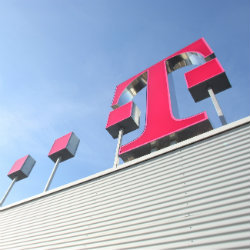German incumbent lashes out at European authorities after they approve Vodafone's takeover of Unitymedia, and says it may request a judicial review.

Deutsche Telekom is considering a legal challenge to the merger between Vodafone and Liberty Global's Unitymedia business after European authorities conditionally approved the deal earlier today.
The German telecom incumbent has been an outspoken critic of the deal, arguing it would restrict competition in the country's cable TV market, and today said the European Commission's proposed remedies would not address concerns.
In comments emailed to Light Reading, the operator said there is widespread industry opposition to the tie-up, which it expects will hinder the deployment of higher-speed all-fiber networks in Germany. "Cable monopolies will continue to be created in the cable-served areas -- supported by the privilege of automatic inclusion of cable TV fees in ancillary rental costs," said a spokesperson for the company. "This closes off an important market not only to Deutsche Telekom, but also to the entire sector."
It had previously argued that merging Vodafone's existing cable assets and Unitymedia would undo a 1990s breakup of the national cable network it once owned. CEO Timotheus Höttges has voiced concern about the "stranglehold" cable companies have on German housing associations. The system of including cable TV fees in rental fees makes it hard for Deutsche Telekom to access those buildings, he has said.
Today's objections come after the European Commission said its analysis indicated the deal would not restrict retail competition but might have an impact on the wholesale TV sector. Vodafone has signed a wholesale contract with Telefónica, Germany's third-biggest telecom operator, to address that issue and will also be subject to some pricing controls and other service obligations.
But those remedies do not go far enough, says Deutsche Telekom. "We are convinced that the conditions demanded are not sufficient to prevent a negative impact on media and program variety," said the company. "We will analyze the decision by the competition authorities intensively and then decide whether a judicial review is necessary to protect competition."
For more fixed broadband market coverage and insights, check out our dedicated broadband content channel here on Light Reading.
Ever since rumors of a deal began to circulate last year, it has been a source of tension between Deutsche Telekom and Vodafone. "I have to be careful not to become personal," said Vittorio Colao -- who as Vodafone's former CEO was an architect of the merger -- when talking about Höttges during a press conference at Mobile World Congress last year. "I was surprised by his comments. He is a giant talking about shutting down competition. If I were him I would not do that."
The overall €18.4 billion ($20.6 billion) agreement with Liberty Global gives Vodafone control of cable assets in the Czech Republic, Germany, Hungary and Romania, and will make it the largest "converged" operator in Europe, said Vodafone in a statement earlier today, with more than 116 million mobile, 24 million broadband and 22 million TV customers across 13 European markets.
Analysts have said the transaction will provide some relief for Vodafone CEO Nick Read, who has had a difficult start as the company boss. Competitive challenges in key European markets and heavy spending on new 5G licenses appear to have driven down the company's share price, which has fallen around 20% since October 1, when Read took charge.
Following today's news, shares were up 1% on the London Stock Exchange during mid-afternoon trading.
Related posts:
— Iain Morris, International Editor, Light Reading
Read more about:
EuropeAbout the Author(s)
You May Also Like











